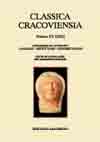The Good, The Bad and The Ugly. Three Cases in the House of Ptolemy
The Good, The Bad and The Ugly. Three Cases in the House of Ptolemy
Author(s): Tomasz GrabowskiSubject(s): Cultural history
Published by: KSIĘGARNIA AKADEMICKA Sp. z o.o.
Keywords: Hellenistic period; the Ptolemies; royal ideology; propaganda
Summary/Abstract: The article focuses on the image of the three rulers of the Lagid Dynasty: Ptolemy IV, Ptolemy VI and Ptolemy VIII, which was included in the sources, The Histories by Polybius in particular the ancient tradition is especially hostile towards Ptolemy IV and Ptolemy VIII, who are presented as the rulers neglecting state matters, concentrated on their own pleasures and, particularly in the case of Ptolemy VIII, cruel. Polybius’ most serious charge leveled against Ptolemy IV concerns his idleness as well as leading an inept foreign policy. In the light of the assessment of Ptolemy IV’s reign, Polybius’ opinion is not completely justified. On can judge that Ptolemy IV’s lifestyle decidedly influenced the opinion concerning his reign. It cannot be ruled out, however, that what we have to deal with in this case is the Ptolemies’ and the antique authors’ different understanding of the concept of tryphé (trufἠ). Affluence as a means of the possibilities of acting and the manifestation of splendour of the monarchy’s power was the idea that formed the basis of the concept of tryphé in the Ptolemies’ propaganda and ideology. Tryphé was the sign of the dynasty’s power, prosperity and constituted a complement of one of the most important elements of the Hellenistic kings’ propaganda, that is euergetism. The concept of tryphé was, nevertheless, ambiguous. In the light of the antique accounts, the understanding of the above concept was dominated by the pejorative aspects, such as a passion for luxury and a riotous lifestyle, which led to debauchery and effeminacy. At least a part of the opinions included in the antique sources can be explained just by the differences in the perception of the concept of tryphé on the part of the Ptolemies and Greek intellectuals. It does not concern only Ptolemy IV and Ptolemy VIII, but also Ptolemy VI, who was very positively presented in the antique tradition. Despite all his real liking for him, Polybius points out his tendency to live life to the full in an excessive manner. Tryphé constituted, however, a significant element of the Lagids’ ideology and it is difficult to suppose that the members of the dynasty consistently used the means which fell on barren ground. Even if the Ptolemies could not reach the intellectual elites in this way, the manifestation of tryphé brought results in the case of the other recipients, such as the ordinary subjects who were supposed to admire the splendour and affluence of the dynasty. When it comes to the representatives of culture and science, the Ptolemies successfully managed to get through to them in different ways, for instance by the acts of euergetism or by providing patronage for culture and science. Nonetheless, tryphé in a considerable way influenced the way in which the Ptolemies were perceived by ancient authors.
Journal: Classica Cracoviensia
- Issue Year: 2012
- Issue No: 15
- Page Range: 81-107
- Page Count: 27
- Language: English

